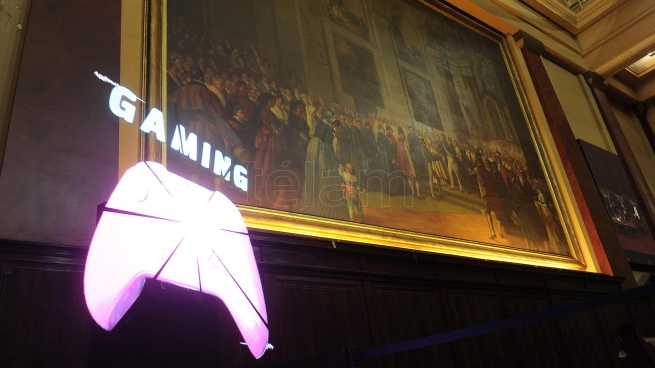The University of Buenos Aires launched this Thursday its own metaversea digital space that has the Faculty of Law as its setting and is similar to a video game, where students can explore spaces, read, interact with each other about pedagogical content and talk to their teachers through graphic characters (avatars). , which inaugurates a “unique in the region” teaching-learning experience.
As if it were the trailer of an animated movie, an avatar walks around the sculpture Floralis Genericalocated in the United Nations square, and then goes to the steps of the faculty, where he enters and meets another person who tells him: “in the Metaverse we also have rights”, it is a small sample of the new interactive world that was presented this afternoon in the assembly hall of the Faculty of Law.
A new paradigm that opens with the Diploma in Metaverse and Gaming who will dictate Laboratory of Innovation and Artificial Intelligence of the UBA (Ialab)a training that will address the subject from various perspectives: the technologies and job opportunities that this world poses to the ethical issue and the regulatory challenges.
For example,what criminal responsibility belongs to those who commit a crime in the metaverse? What are the boundaries between the physical and virtual world? What about acts of discrimination or sexual assault? What security measures are in place? Questions to which is also added the issue of algorithmic gender biases and the possible problems that may arise from facial recognition systems.
The classroom will be the metaverse, the scenario that will be tried to teach: “We developed a metaverse to explain the metaverse, and it is an experience that does not exist in any other Latin American university,” Juan Corvalán, director of training and Ialab, told Télam.
The challenge of this course, he pointed out, is to generate a “pedagogical transformation strategy on how to evaluate and how to read, so that it becomes more interactive and immersive”, explained the specialist.
“The idea is also to combine views from a multigenerational place, that is: learn from people with a lot of experience and also from young video game players who have gaming skills and then can transfer, for example, to a job,” he reflected.
This first version of the metaverse “it is a pilot test“, he clarified, and “the idea is to transfer it later to other contents and other faculties of the UBA”.
what is the metaverse
There are different ways of defining it and today it does not have a finished version since it is under development, but in general terms it is known as an immersive universe that integrates virtual and augmented reality, where different actions can be generated (just as in the world physical, for example buying in a supermarket) and that has as a gateway to the avatars, which “constitute a new mode of mediation with technology”, explained the specialist.
“Today our mode of intermediation with technology is through clicks, opening windows, the mouse/joystick or talking to a machine to make it do something, but what the avatar does is enrich that experience,” he added.
It is a more sophisticated expression that, in some cases, adds super-realistic representation techniques, as happens, for example, with the characters of soccer players in some video games.
There are more and less sophisticated metaverses, in the case of the UBA “we wanted to make it inclusive so it will not be necessary to have a helmet to go through it and it can be done with the computer keyboardas if it were a digital space,” he remarked.
People will be able to download an executable program of this first version of the metaverse on their computer, then choose their avatar (which are designed without gender) and finally start moving around the scenario that includes the Faculty of Law and its surroundings (until the monument of the generic floralis).
There they will find some experiences such as, for example, being able to visit the corners of that house of studies and meet a person who will tell them the history of the UBA.
Corvalan explained that the training has two modalities: one free for anyone and without prerequisites, which lasts 20 hours; and another paid, with postgraduate characteristics, whose registration can be done here.
The social and ethical issue
During the presentation, there were panels with references that addressed the different approaches to this universe, such as the ethical and social issue of the metaverse and the challenge it poses in the future.
One of them was Lee Ulmanndirector for Latin America of the School of Administration of the Massachusetts Institute of Technology (MIT), who considered “excellent that the UBA enters this world”, but stressed the importance of “continuing to think about the social aspect of artificial intelligence on how to improve the lives of people and the planet”.
I don’t think we should stop but in parallel we need to think about the ethics and social responsibility of what we are doing”, completed the MIT referent.
In this line, Cecilia Danesi, Researcher and professor in artificial intelligence and gender, expressed herself, who said: “It is key that we work with an ethical and social view of artificial intelligence, and not behind an economic objective.”
In the presentation they also presented Daniela Dupuydirector of the International Diploma in Cybercrime and Investigative Technologies; Leandro Vergara, elected dean for the period 2023-2027 of the Faculty of Law of the UBA; Y Daniel Shepherd, Research Secretary of the Faculty of Law of the UBA, among other references.











